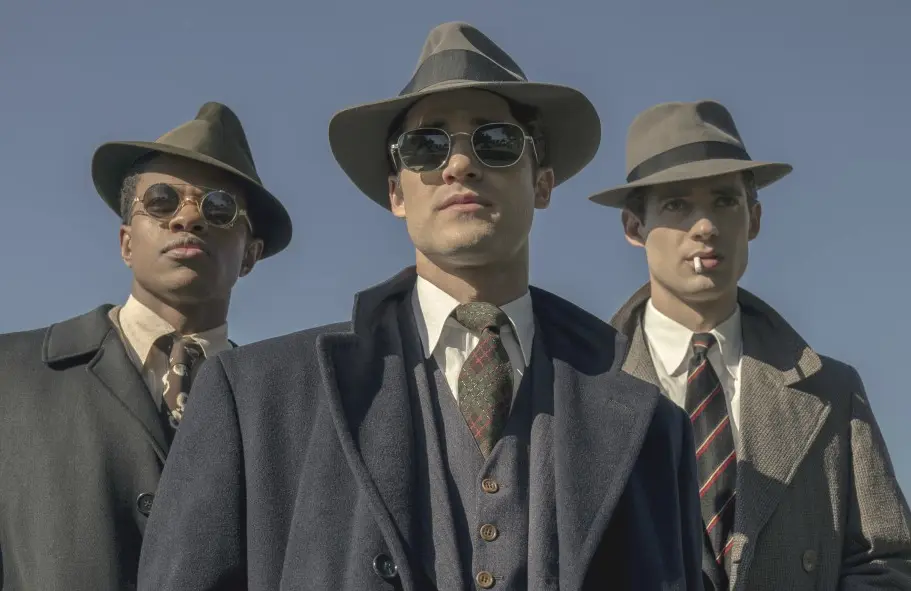Hooray For Hollywood: Ryan Murphy Imagines a Sunnier History for the Movie Biz
-
 Jeremy Pope, Darren Criss and David Corenswet in Hollywood. (Netflix)
Jeremy Pope, Darren Criss and David Corenswet in Hollywood. (Netflix)In the very first season of American Horror Story, Ryan Murphy placed his titular Murder House on a tour of notorious Los Angeles landmarks. Among other dark tales of La La Land, Murphy relayed the tale of the Black Dahlia, the young aspiring starlet who was found gruesomely murdered in the 1940s. That season also featured a toxic, bickering gay couple who end up murdered by a rubber-clad man in a manner that recalls a kinky sexual encounter gone wrong. It's not like Ryan Murphy was ever a TV creator who shied away from the darker side of things. His Nip/Tuck was a critique on the beauty industry that featured a serial killer who maimed his victims with a rictus grin. Even shows like Popular and Glee used their sunny facades for darkly comedic purposes.
With Hollywood, the new Netflix miniseries from Murphy and his Glee co-creator Ian Brennan, Murphy doesn't need to uncover the dark side of the movie industry. Decades of racism, sexism, sexual harassment, and homophobia within the studio system have already been exposed in tell-alls and movies and TV series like Murphy's own Feud, which explored the notorious enmity between Bette Davis and Joan Crawford through the lens of the systematic sexism to which both actresses were subjected. Murphy stayed more or less faithful to Davis and Crawford's stories, only breaking away into a fanciful, magical-realist notion of the end of Crawford's life in the finale. Hollywood sees Murphy taking a different approach, incorporating real life figures like closeted leading man Rock Hudson (Jake Picking), his vile agent, Henry Wilson (Jim Parsons), and first black Oscar winner Hattie McDaniel (Queen Latifah), with fictional aspiring actors, writers, directors, and producers all trying to break through on the same film: a biopic of actress Peg Entwhistle, who infamously leaped to her death from the "H" of the Hollywoodland sign in the 1920s.

There's screenwriter Archie Coleman (Jeremy Pope), who is black and gay; director Raymond Ainsley (Darren Criss) who's looking to make the film and cast his girlfriend Camille Washington (Laura Harrier), who as a black woman has been relegated to playing maids; actor Jack Castello (David Corenswet), who takes up a job as a male escort to make ends meet; producers Dick Samuels (Joe Mantello) and Ellen Kincaid (Holland Taylor); and wife of the studio head Avis Amberg (Patti LuPone), whose thwarted ambitions are being passed down to her aspiring actress daughter Claire (Samara Weaving). Through the prism of the fictional Peg production, the real history of Hollywood's bigotry and predation is explored.
But Murphy doesn't stop at that, and that's where Hollywood becomes something wholly unexpected, especially as a Ryan Murphy production. About halfway through the season, what seems to be a cast of characters caught up in a diseased and hateful machine and destined to be crushed under its gears, collectively (more or less) bands together, determined to defy the system. Peg (retitled Meg, don't worry about it) will go forward with its black female lead and black queer writer to be a beacon for audiences who haven't been able to see themselves or their experiences on the silver screen. Movie houses in the south will boycott, and the studio will risk losing its shirt, but they will be bold and strike a blow for Hollywood as a force for good. If they can get the movie made.
What follows is a kind of alternate history of Hollywood, one which learns the lessons of the present day decades ahead of schedule. It's a show that dares to dream of what might have been had everybody figured it out so much sooner. Of course, real history doesn't work like that, and for some, Hollywood will come across as flimsy or naive in its follow-through. But this optimistic turn also represents a remarkable tonal evolution for Murphy. In this way, Hollywood owes its biggest debt to Pose, the Murphy-produced series about the queer culture surrounding the drag balls of 1980s New York City. That show situates itself in the middle of a nightmare period in history, when AIDS and violence and homophobia and transphobia ravaged the queer community. Pose doesn't shy away from this, but it has also consistently found a way to find moments of grace and beauty amid its bleak history, as well as genuine optimism in the strength of its characters' chosen-family bond.
In many ways, Hollywood plays like two different shows: one a dishy, tawdry tell-all about what was happening behind the scenes during Hollywood's golden era; the other a revisionist history that is in turns bold and convenient. Trying to marry the two can feel like a bait-and-switch at times, where we were lured in by the promise of sexy closeted actors and an infamous Hollywood brothel run out of a gas station, only to find earnest strivers fighting adversity. The former is what we've come to expect from a Ryan Murphy series. The latter is what we should probably start to anticipate as well.
All seven episodes of Hollywood Season 1 drop today on Netflix.
People are talking about Hollywood in our forums. Join the conversation.
Joe Reid is the senior writer at Primetimer and co-host of the This Had Oscar Buzz podcast. His work has appeared in Decider, NPR, HuffPost, The Atlantic, Slate, Polygon, Vanity Fair, Vulture, The A.V. Club and more.
TOPICS: Hollywood, Netflix, American Horror Story: Murder House, Pose, Ryan Murphy
- Did Cora Susan Collins have a husband and a kid? Family details explored as tributes pour in for actress' death at 98
- Ryan Murphy's work is suffering on Netflix: He now seems to favor winners over underdogs
- Ryan Murphy's Netflix Report Card
- Ryan Murphy is now 0 for 3 with his Netflix shows, at least in terms of critical acclaim